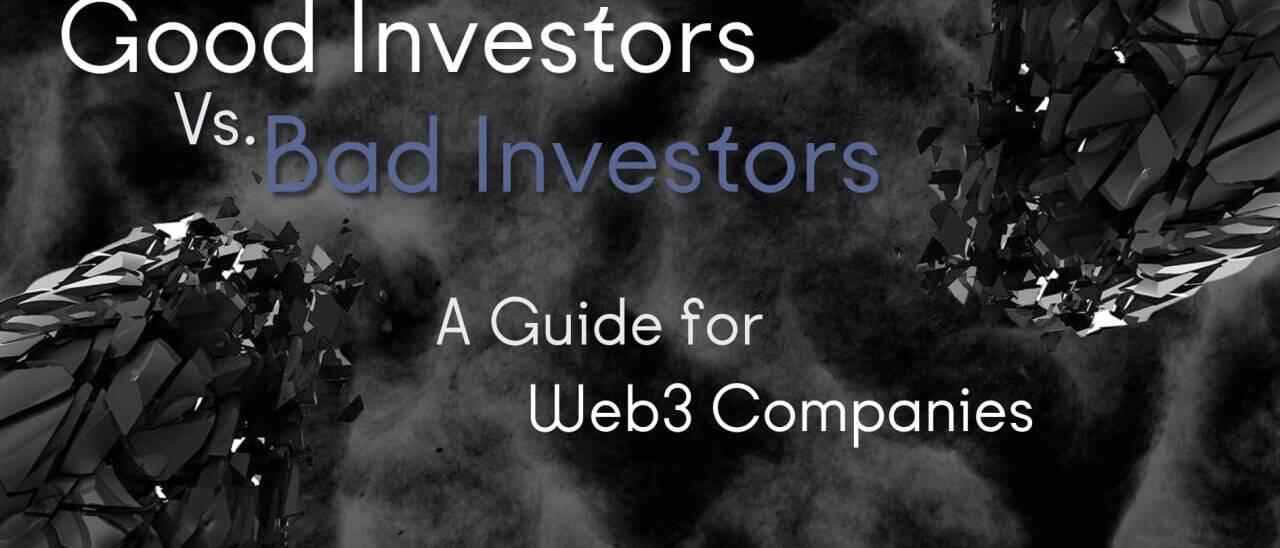Arcanum Ventures
Arcanum Ventures is a venture capital investment firm, blockchain advisory service, and digital asset educator. We bring precise knowledge and top-tier expertise in advising blockchain startups.
Arcanum demystifies the blockchain space for its partners by providing intelligent, poised, crystal clear, and authentic input powered by our passion to empower and champion our allies.
We unravel the mysteries and unlock the opportunities in blockchain, Web3, and other emerging innovations.
Good Investors vs. Bad Investors: A Guide for Web3 Companies
Amongst the sea of challenges facing startup founders, is the decision of bringing on external capital. But that is just the beginning.
Investors come in all shapes and sizes, with different motivations and levels of support. Determining what value an investor can bring during the fundraising process is every bit as important as creating a business model or developing a product.
Aside from the obvious need of infusing capital into your early-stage company, choosing investors that align with your company’s vision and bring support in a variety of ways can increase the likelihood that your web3 startup survives. Conversely, taking on bad investors can cause considerable harm to your mission.
Why Fundraising is Necessary for Web3 Startups
Unless you have the means to bootstrap your own development and build a viable product or revenue stream without taking on funds, you’ll likely need to court investors. That is why investors are generally needed most of the time for new startups looking to change the world. This truth rings especially true in the upstart web3 space, where innovative platforms and products often struggle to attract investor attention in an ever-growing market.
Positioning your startup in the most favorable way can give you more leverage to negotiate and give your company the pick of the litter when it comes to accepting new investors. Aside from the obvious need for startup capital to pay for development and team salaries, there are a host of other reasons why a web3 startup might take on investment. On the flip side, several potential negative consequences of taking external capital from investors must be weighed anytime an investment offer is on the table.
The Benefits of Accepting External Investment Capital
Startup Capital
As mentioned above, external capital to pay salaries, develop products, build a marketing plan for your product, and reach out to additional investors is usually necessary for new companies unless the team is able to fund everything itself.
Validation and Credibility
Confidence and public perception of your company and its vision, business plan, and roadmap can benefit tremendously with the help of high-profile investment firms. Having the right backers featured on your pitch deck, or investor documents can give your web3 company a much-needed boost in the fundraising stage and beyond.
Networking and Business Development Help
Those familiar with the blockchain industry know how hard it is to bring on customers, especially with B2B products. Being able to connect with partners before a product is even launched can bolster a company early on and ensure that customer acquisition and business scaling are effortless.
Bonus points for investors that can connect a startup team with entities outside of the web3 space to give an extra bump of credibility and recognition.
Helpful Advice and Input
Leaning on the opinions and advice from early investors can be an underrated aspect of having an external capital infusion in the first place.
One would hope these investors are engaged and interested in seeing the team hit milestones on the roadmap and launch a successful and sustainable company. Often their input is valid and relevant, especially when they have been investing in startup companies for a long time.
The Downside to Accepting External Investment Capital
Giving Up a Stake in Your Company
Willing to let go of even a small stake in your company? You must also get used to having more investors you are beholden to. Weighing their input and advice is ideally a benefit of having investors on board, but these relationships can turn sour if there is a misalignment in values or motivations between the company and the investor.
Some investors can also smell desperation, leading to predatory offers and a sizeable asking price for the investment.
External Pressure
Feeling the heat from one investor can be intense. Expectations can be high, and the demand for immediate results can bring unnecessary pressure on a startup team.
Now imagine this compounded by the fact that there very well might be dozens of investment entities on board, not to mention hundreds or even thousands of retail investors, all carrying with them different opinions on the direction of the company.
Fundraising is Not Easy
Countless hours spent on calls and investor pitches can be exhausting. Hundreds of cold emails met with rejection can wear a team down. The time and resource cost for entertaining investors and answering questions is, without a doubt, a major reason why some startups never secure any investment in the first place, especially in unfavorable market conditions.
Negative Reputation by Association
Sometimes a company’s survival depends on the injection of capital, but a company should never sacrifice its morals or reputation. This oftentimes leads to difficult decisions when a team is desperate for funding.
Taking money from an investor can tie you to their reputation, whether good or bad. In the wake of the recent Alameda Research & FTX collapse, we’ve seen companies refunding these institutions’ investments to distance themselves from the fallout and insulate their reputation.
Is Fundraising Right for Your Web3 Company?
Aside from determining if accepting outside capital is right for your web3 startup, there are some other questions a founding team must ask itself like:
“How much control of the company are we comfortable giving up?”
“What additional support do I expect from my investors?”
“Does this investor have the company’s best interests in mind?”
“Should actual equity stake shares in the company be offered, cryptocurrency tokens, or a combination of both in return for an investment of capital?”
These are just a few of the items a team must consider, making the fundraising process all the more intimidating, especially for first-time founders within the blockchain industry. Chief among those concerns should be a focus on whether you are bringing “good money” or “bad money” into the fold.
But how can a team in the midst of fundraising possibly know the difference between a good investor and a bad one?
Knowing the Difference Between Good Investors and Bad Investors
Startup founders pour their heart and soul into the product they are building. Desperate times can call for desperate measures, but why sacrifice years of work and sweat equity just to feature unsupportive or even malicious investors on your cap sheet?
This is why we believe that startup founders must do the same strenuous research on their potential investors that venture capital firms and angel investors should be doing when they investigate the viability of an investment opportunity.
So what exactly mean when we say “good money” vs. “bad money,” and how can a startup team tell the difference?”
Qualities of a Good Investor
- Good investors understand the importance of supporting beyond their financial support and investment.
- Good investors are smart enough to realize that they are protecting the future value of their equity (tokens or otherwise) by doing everything in their power to promote a company and make sure they have the tools they need to survive and thrive.
- Good investors don’t need to be asked for support; they offer it consistently.
- Good investors have trustworthy reputations and are trendsetters when it comes to the investments they make.
- Good investors don’t dump tokens or sell equity prematurely before a team can bring a product or service to market.
- Good investors are transparent and communicative with their return horizon and their liquidation timeline/strategy.
Qualities of a Bad Investor
- Bad investors dump tokens as soon as they can without considering the company’s needs.
- Bad investors don’t think about the health of the company they invest in or the consequences of their actions.
- Bad investors bring a cloud of bad reputation to a company they invest in by engaging in past malicious activities or troubling practices.
- Bad investors need to be begged for marketing help, networking support, strategic advice, or input.
- Bad investors make unrealistic demands, are impatient and put unnecessary pressure on startup company teams to deliver results ahead of schedule.
How We Support with Arcanum Investments and Advisory
It can be tricky to draw a conclusive line between what investors should provide when backing a web3 company and what should be classified as additional advisory support.
At Arcanum Ventures, we aim to go above and beyond when we choose a company to support. We believe that it makes sense to do everything in our power to ensure the longevity and success of our investment portfolio of projects.
If there is anything our robust backing of a company doesn’t cover, we’re proud to offer an arsenal of advisory support and supplementary services to give our investments everything they need to thrive in the upstart web3 space.
If you’re interested in investment, advisory, or a list of services we provide to web3 teams, we encourage you to fill out the relevant form and connect with us!
Arcanum Ventures
Arcanum Ventures is a venture capital investment firm, blockchain advisory service, and digital asset educator. We bring precise knowledge and top-tier expertise in advising blockchain startups.
Arcanum demystifies the blockchain space for its partners by providing intelligent, poised, crystal clear, and authentic input powered by our passion to empower and champion our allies.
We unravel the mysteries and unlock the opportunities in blockchain, Web3, and other emerging innovations.
April 16, 2024
Transparency and accountability - two principles blockchain is rooted in, and two core tenets of Arcanum…
April 11, 2024
Arcanum Ventures is proud to announce our long-term support and incubation for Qualoo and its team. Their…
April 4, 2024
Arcanum Ventures is pleased to announce our latest strategic investment in Analog, a novel ‘Proof-of-Time’…



